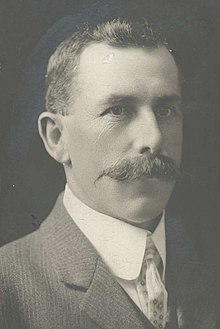Llewellyn Atkinson
Llewellyn Atkinson | |
|---|---|
 | |
| Member of the Australian Parliament for Wilmot | |
| In office 12 December 1906 – 12 October 1929 | |
| Preceded by | Norman Cameron |
| Succeeded by | Joseph Lyons |
| Personal details | |
| Born | 18 December 1867 Launceston, Tasmania |
| Died | 1 November 1945 (aged 77) Latrobe, Tasmania |
| Nationality | Australian |
| Political party | Anti-Socialist (1906–09) Liberal (1909–17) Nationalist (1917–22) Country (1922–28) Nationalist (1928–29) |
Llewellyn Atkinson (18 December 1867 – 1 November 1945) was an Australian politician. He was a member of the Australian House of Representatives from 1906 to 1929 and a member of the Tasmanian House of Assembly from 1931 to 1934, representing successive conservative parties.
Atkinson was born in Launceston, Tasmania and was educated at Launceston Church Grammar School. He enrolled at the University of Melbourne to study law in 1885, where he was resident at Trinity College.[1] He was called to the bar in 1894 and became a solicitor, returning to Tasmania to practise at Latrobe and later forming a partnership with T. A. Scott.[2][3][4] He was a member of the Latrobe Town Board and the board of management of the Devon Hospital and a prominent local Freemason, serving as master of the Concord Masonic Lodge and a longstanding member of the Latrobe Mistletoe Lodge. Atkinson was also a keen sportsman and a talented cricketer and footballer in his youth.[5][6]
He was elected to the Australian House of Representatives of Wilmot at the 1906 election and held it until his defeat by Joseph Lyons at the 1929 election, representing successively the Free Trade Party, the Anti-Socialist Party, the Commonwealth Liberal Party, the Nationalist Party and the Country Party, an independent and then Nationalist again.[7] He was appointed Vice-President of the Executive Council in the first Bruce Ministry from February 1923 to June 1926.[2][8]
In 1931, he was elected as a Nationalist to the Tasmanian Legislative Council seat of Wilmot, but was defeated for re-election in 1934. He died at Latrobe in 1945 and was buried at the Latrobe General Cemetery. He never married, and resided with his sister at their family country home, "Frogmore".[9][5][10]
Notes[]
- ^ Calendar of Trinity College (Melbourne: The College, 1897), p. 213.
- ^ a b "Mr Llewellyn Atkinson". The Mercury. CLXII (23, 374). Tasmania, Australia. 3 November 1945. p. 6. Retrieved 7 December 2019 – via National Library of Australia.
- ^ "HON. LLEWELLYN ATKINSON, B.A., LL.B." The Register (Adelaide). LXXXVIII (25, 623). South Australia. 10 February 1923. p. 9. Retrieved 7 December 2019 – via National Library of Australia.
- ^ "GOWN AND WIG". The Herald (4326). Victoria, Australia. 4 May 1894. p. 2. Retrieved 7 December 2019 – via National Library of Australia.
- ^ a b "LATE MR. L. ATKINSON". The Advocate (Australia). Tasmania, Australia. 9 November 1945. p. 2. Retrieved 7 December 2019 – via National Library of Australia.
- ^ "OBITUARY LATE MR. L. ATKINSON". The Advocate (Australia). Tasmania, Australia. 3 November 1945. p. 2. Retrieved 7 December 2019 – via National Library of Australia.
- ^ "Members of the Senate since 1901". Parliamentary Handbook. Parliament of Australia. Archived from the original on 7 September 2007. Retrieved 7 December 2019.
- ^ "LEFT THE COUNTRY PARTY". The Telegraph (16, 741). Queensland, Australia. 29 July 1926. p. 16 (5 O'CLOCK CITY EDITION). Retrieved 7 December 2019 – via National Library of Australia.
- ^ "Atkinson, Llewellyn". The Parliament of Tasmania from 1856. Parliament of Tasmania. Retrieved 7 December 2019.
- ^ "OBITUARY LATE MR. L. ATKINSON". The Advocate (Australia). Tasmania, Australia. 3 November 1945. p. 2. Retrieved 7 December 2019 – via National Library of Australia.
- People educated at Trinity College (University of Melbourne)
- Free Trade Party members of the Parliament of Australia
- Commonwealth Liberal Party members of the Parliament of Australia
- Nationalist Party of Australia members of the Parliament of Australia
- National Party of Australia members of the Parliament of Australia
- Members of the Australian House of Representatives for Wilmot
- Members of the Australian House of Representatives
- Members of the Cabinet of Australia
- Members of the Tasmanian Legislative Council
- 1867 births
- 1945 deaths
- People from Launceston, Tasmania
- 20th-century Australian politicians